
llm_interview_note
主要记录大语言大模型(LLMs) 算法(应用)工程师相关的知识及面试题
Stars: 2064
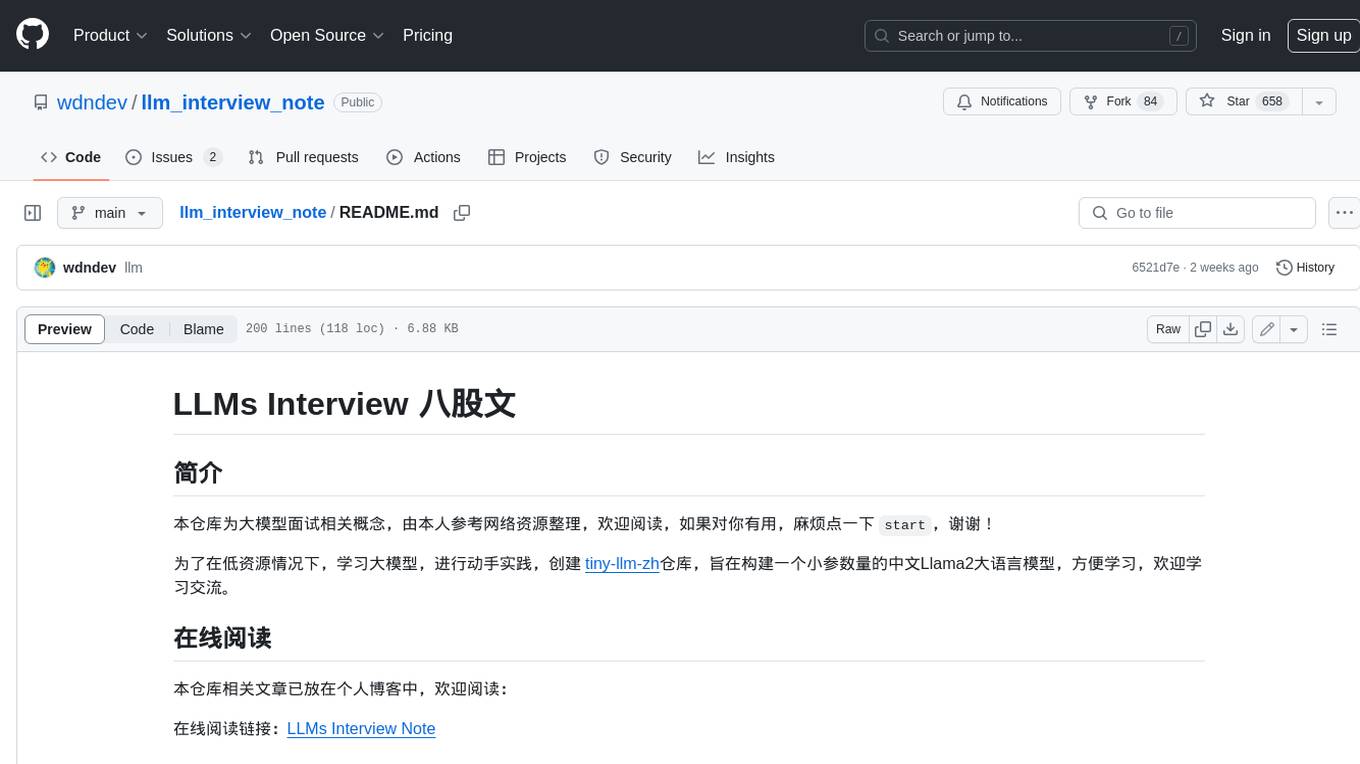
This repository provides a comprehensive overview of large language models (LLMs), covering various aspects such as their history, types, underlying architecture, training techniques, and applications. It includes detailed explanations of key concepts like Transformer models, distributed training, fine-tuning, and reinforcement learning. The repository also discusses the evaluation and limitations of LLMs, including the phenomenon of hallucinations. Additionally, it provides a list of related courses and references for further exploration.
README:
本仓库为大模型面试相关概念,由本人参考网络资源整理,欢迎阅读,如果对你有用,麻烦点一下 🌟 star,谢谢!
为了在低资源情况下,学习大模型,进行动手实践,创建 tiny-llm-zh仓库,旨在构建一个小参数量的中文大语言模型,该项目已部署,可以在如下网站上体验:ModeScope Tiny LLM。
其他学习资源推荐:
- llama3-from-scratch-zh : 从零实现 llama3, 可加载 meta 官方权重,可在本地笔记本(16G内存)调试运行
- tiny-rag : 实现一个简单的RAG系统,支持多路召回、重排等功能,快速了解搜索相关内容;
在线阅读链接:LLMs Interview Note
相关答案为自己撰写,若有不合理地方,请指出修正,谢谢!
欢迎关注微信公众号,会不定期更新LLM内容,以及一些面试经验:
For Tasks:
Click tags to check more tools for each tasksFor Jobs:
Alternative AI tools for llm_interview_note
Similar Open Source Tools

llm_interview_note
This repository provides a comprehensive overview of large language models (LLMs), covering various aspects such as their history, types, underlying architecture, training techniques, and applications. It includes detailed explanations of key concepts like Transformer models, distributed training, fine-tuning, and reinforcement learning. The repository also discusses the evaluation and limitations of LLMs, including the phenomenon of hallucinations. Additionally, it provides a list of related courses and references for further exploration.
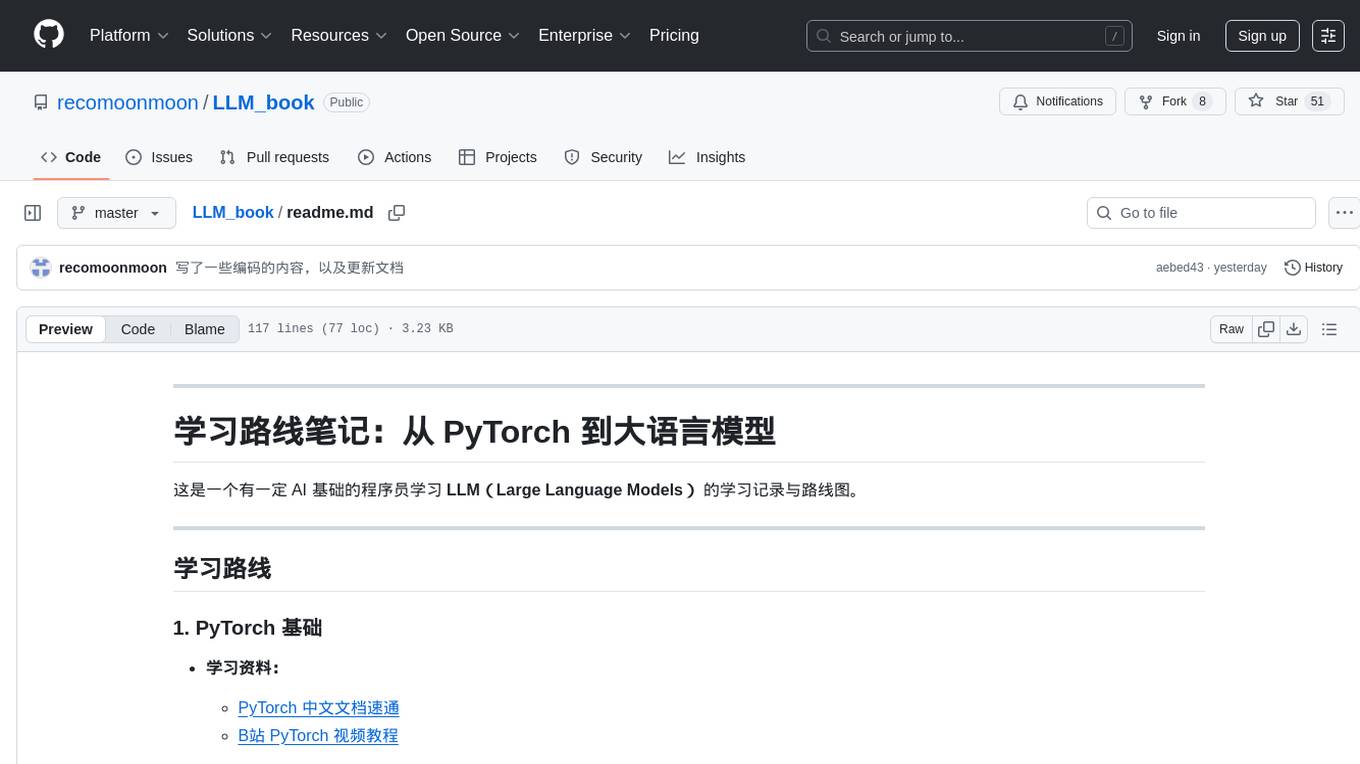
LLM_book
LLM_book is a learning record and roadmap for programmers with a certain AI foundation to learn Large Language Models (LLM). It covers topics such as PyTorch basics, Transformer architecture, langchain basics, foundational concepts of large models, fine-tuning methods, RAG (Retrieval-Augmented Generation), and building intelligent agents using LLM. The repository provides learning materials, code implementations, and documentation to help users progress in understanding and implementing LLM technologies.
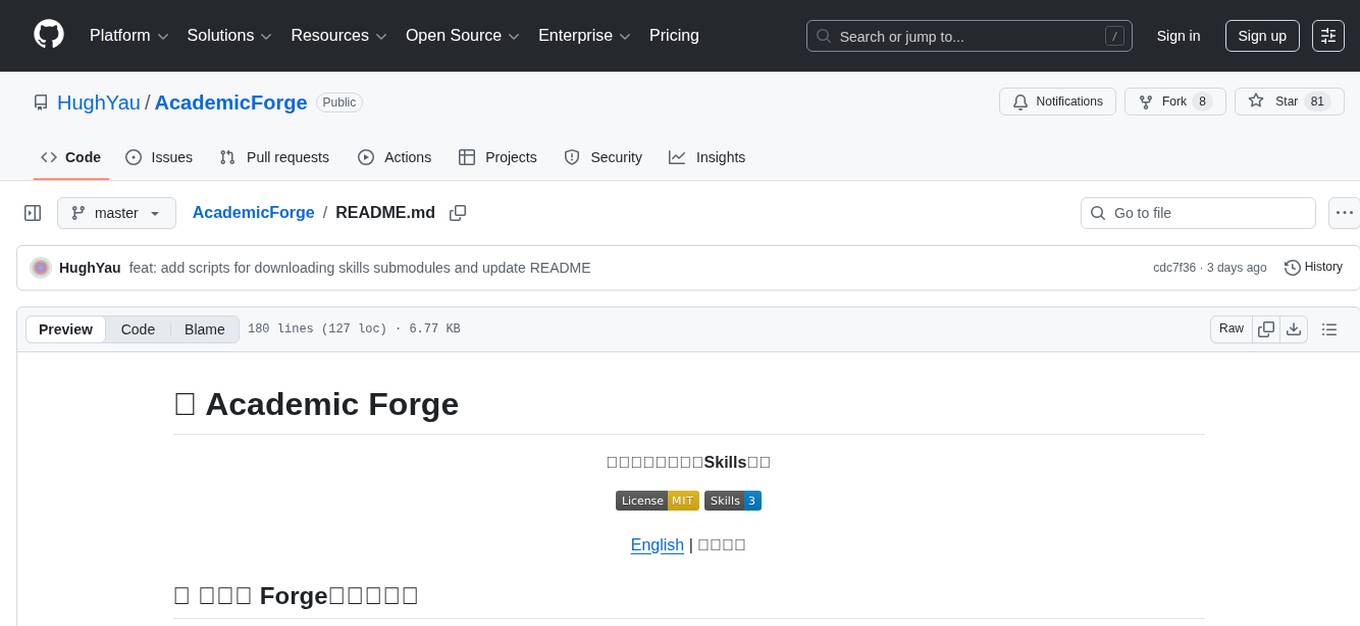
AcademicForge
Academic Forge is a collection of skills integrated for academic writing workflows. It provides a curated set of skills related to academic writing and research, allowing for precise skill calls, avoiding confusion between similar skills, maintaining focus on research workflows, and receiving timely updates from original authors. The forge integrates carefully selected skills covering various areas such as bioinformatics, clinical research, data analysis, scientific writing, laboratory automation, machine learning, databases, AI research, model architectures, fine-tuning, post-training, distributed training, optimization, inference, evaluation, agents, multimodal tasks, and machine learning paper writing. It is designed to streamline the academic writing and AI research processes by providing a cohesive and community-driven collection of skills.
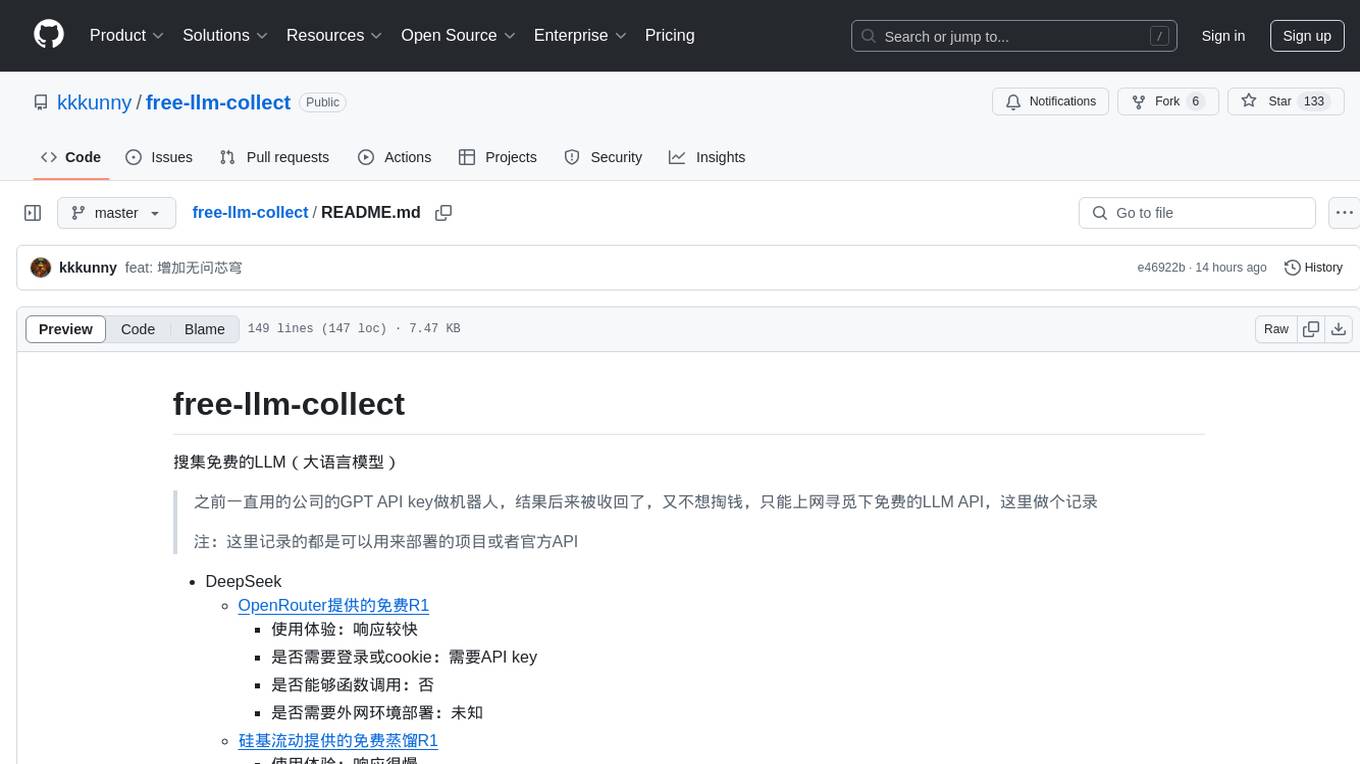
free-llm-collect
This repository is a collection of free large language models (LLMs) that can be used for various natural language processing tasks. It includes information on different free LLM APIs and projects that can be deployed without cost. Users can find details on the performance, login requirements, function calling capabilities, and deployment environments of each listed LLM source.
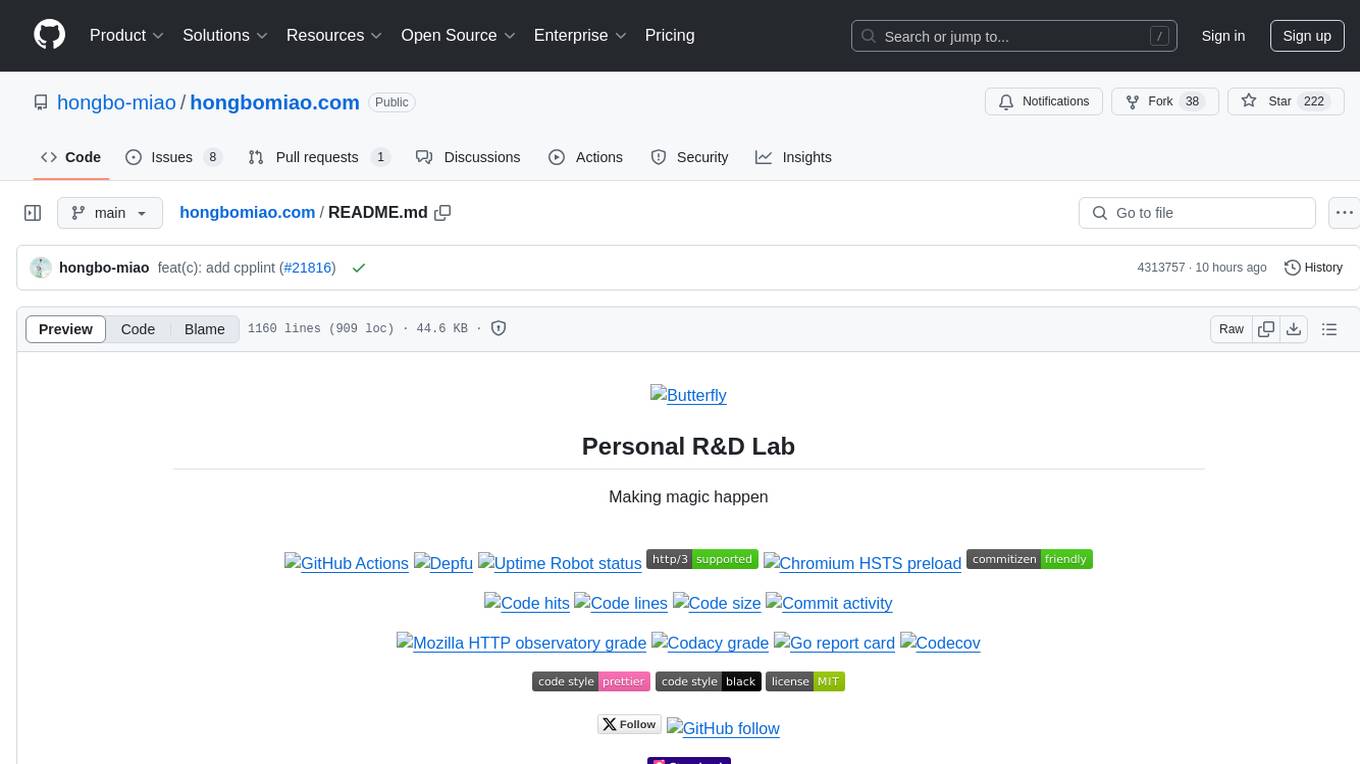
hongbomiao.com
hongbomiao.com is a personal research and development (R&D) lab that facilitates the sharing of knowledge. The repository covers a wide range of topics including web development, mobile development, desktop applications, API servers, cloud native technologies, data processing, machine learning, computer vision, embedded systems, simulation, database management, data cleaning, data orchestration, testing, ops, authentication, authorization, security, system tools, reverse engineering, Ethereum, hardware, network, guidelines, design, bots, and more. It provides detailed information on various tools, frameworks, libraries, and platforms used in these domains.
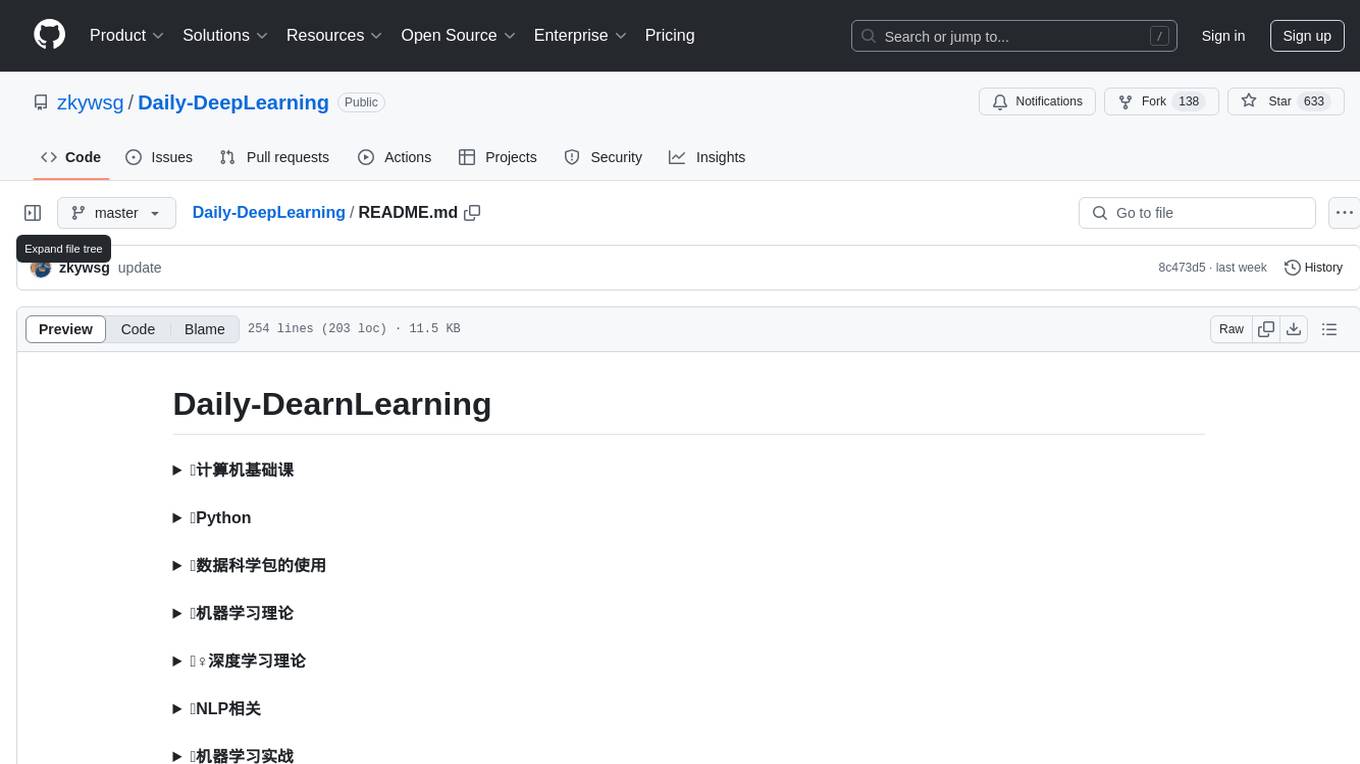
Daily-DeepLearning
Daily-DeepLearning is a repository that covers various computer science topics such as data structures, operating systems, computer networks, Python programming, data science packages like numpy, pandas, matplotlib, machine learning theories, deep learning theories, NLP concepts, machine learning practical applications, deep learning practical applications, and big data technologies like Hadoop and Hive. It also includes coding exercises related to '剑指offer'. The repository provides detailed explanations and examples for each topic, making it a comprehensive resource for learning and practicing different aspects of computer science and data-related fields.
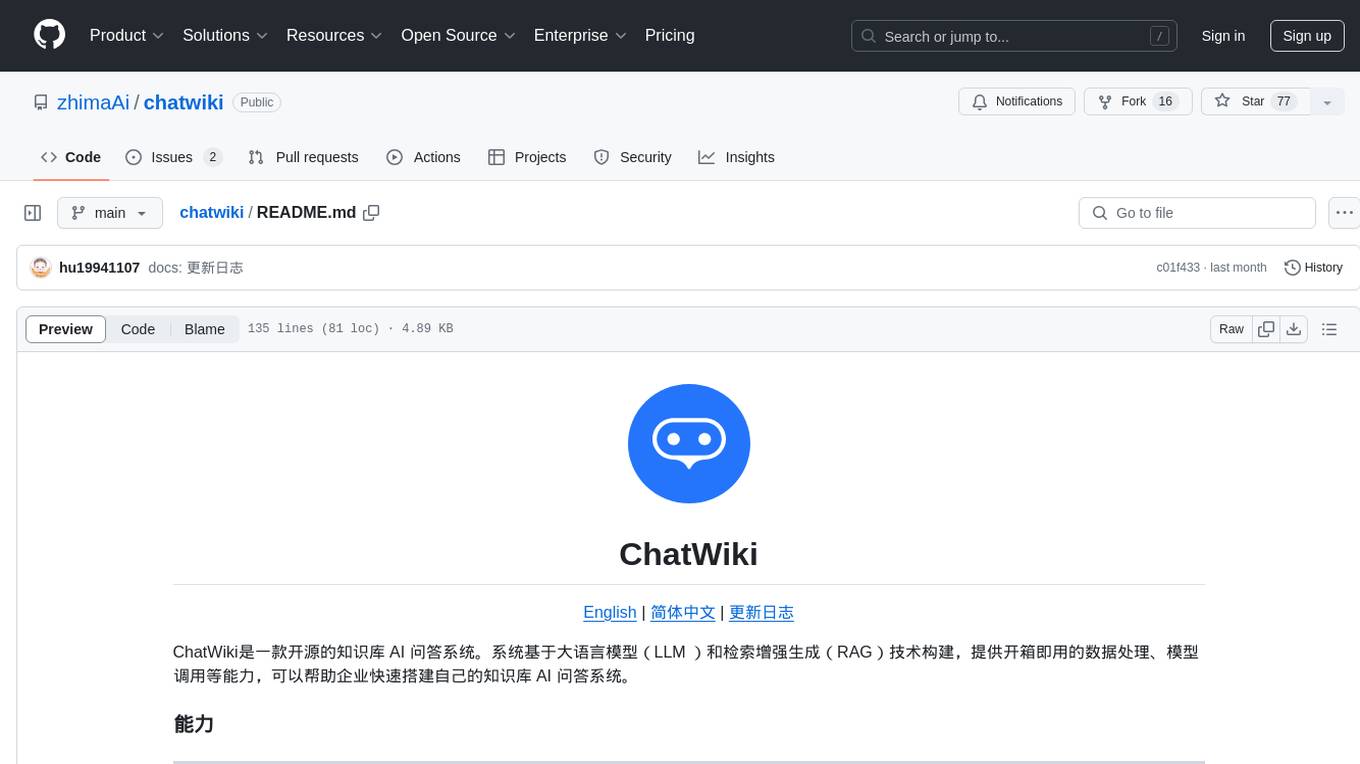
chatwiki
ChatWiki is an open-source knowledge base AI question-answering system. It is built on large language models (LLM) and retrieval-augmented generation (RAG) technologies, providing out-of-the-box data processing, model invocation capabilities, and helping enterprises quickly build their own knowledge base AI question-answering systems. It offers exclusive AI question-answering system, easy integration of models, data preprocessing, simple user interface design, and adaptability to different business scenarios.
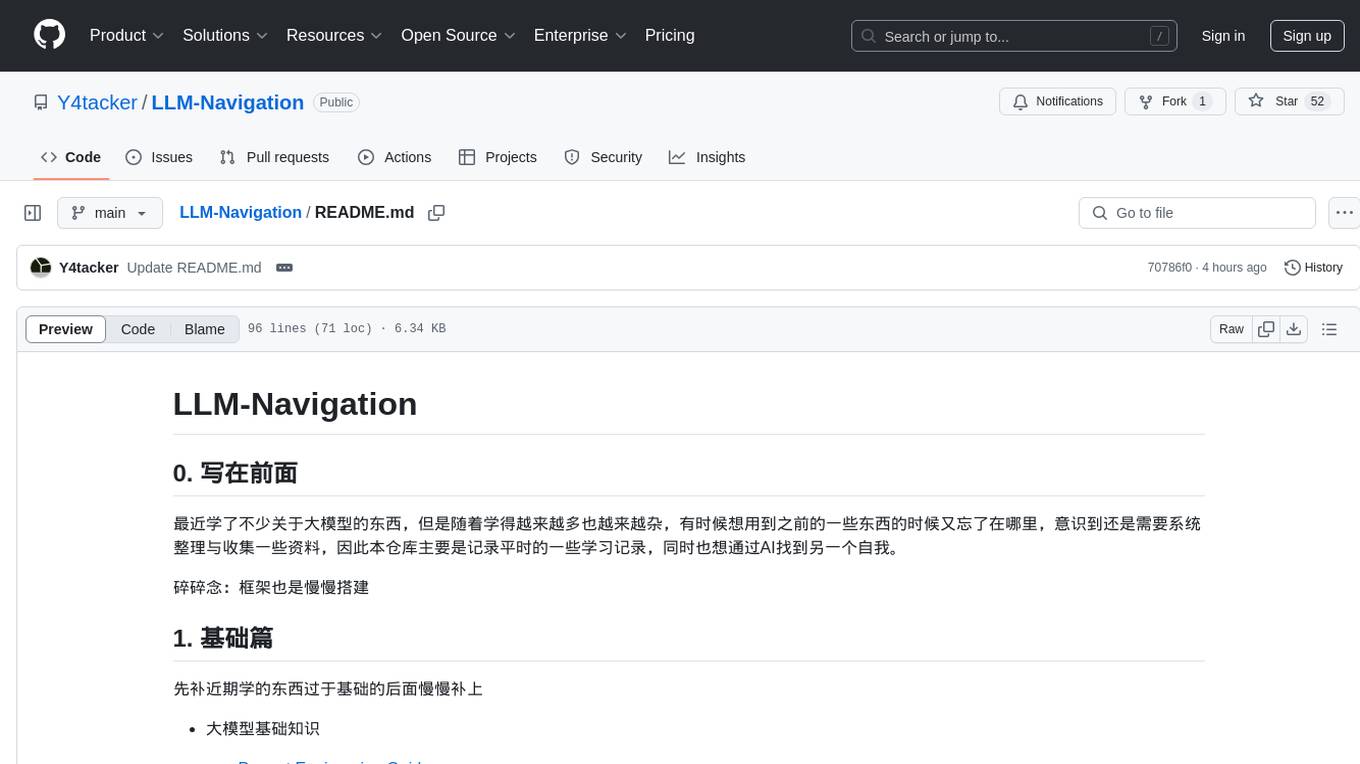
LLM-Navigation
LLM-Navigation is a repository dedicated to documenting learning records related to large models, including basic knowledge, prompt engineering, building effective agents, model expansion capabilities, security measures against prompt injection, and applications in various fields such as AI agent control, browser automation, financial analysis, 3D modeling, and tool navigation using MCP servers. The repository aims to organize and collect information for personal learning and self-improvement through AI exploration.
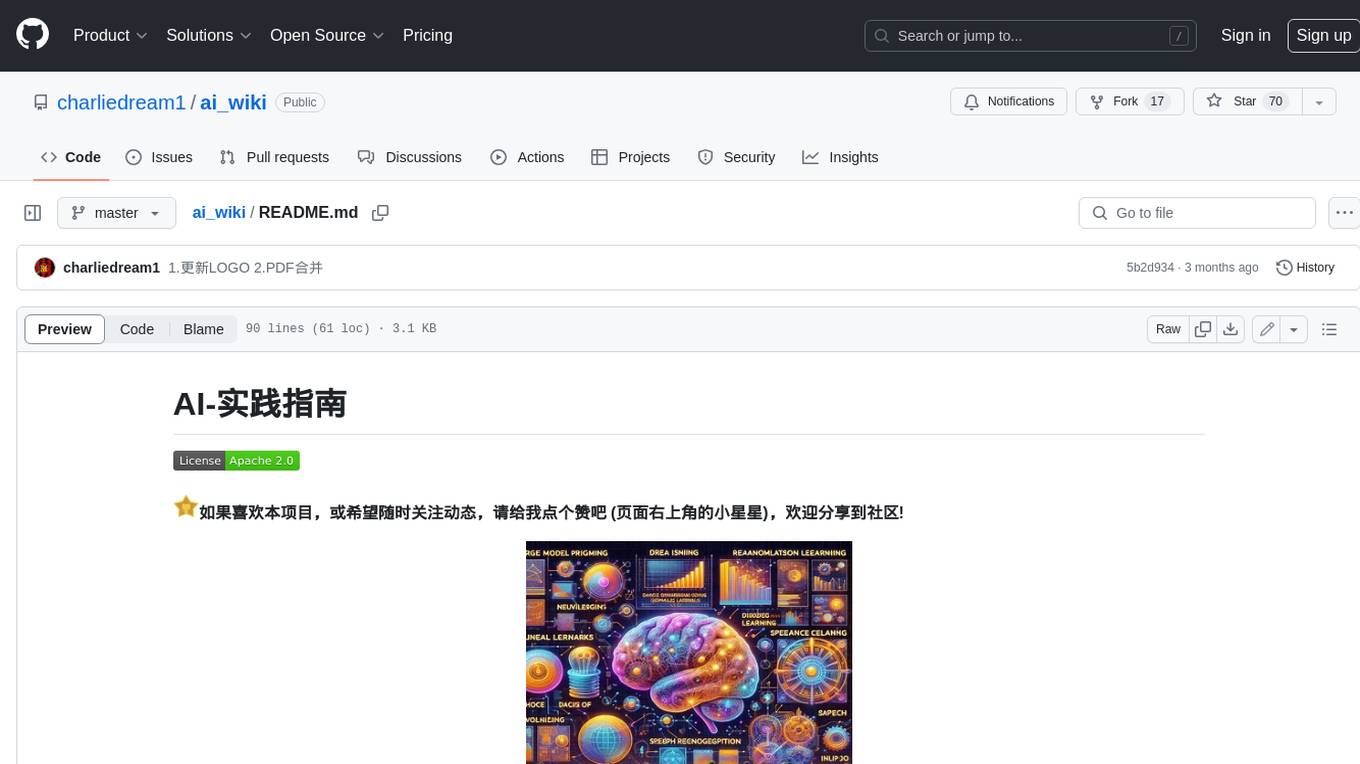
ai_wiki
This repository provides a comprehensive collection of resources, open-source tools, and knowledge related to quantitative analysis. It serves as a valuable knowledge base and navigation guide for individuals interested in various aspects of quantitative investing, including platforms, programming languages, mathematical foundations, machine learning, deep learning, and practical applications. The repository is well-structured and organized, with clear sections covering different topics. It includes resources on system platforms, programming codes, mathematical foundations, algorithm principles, machine learning, deep learning, reinforcement learning, graph networks, model deployment, and practical applications. Additionally, there are dedicated sections on quantitative trading and investment, as well as large models. The repository is actively maintained and updated, ensuring that users have access to the latest information and resources.
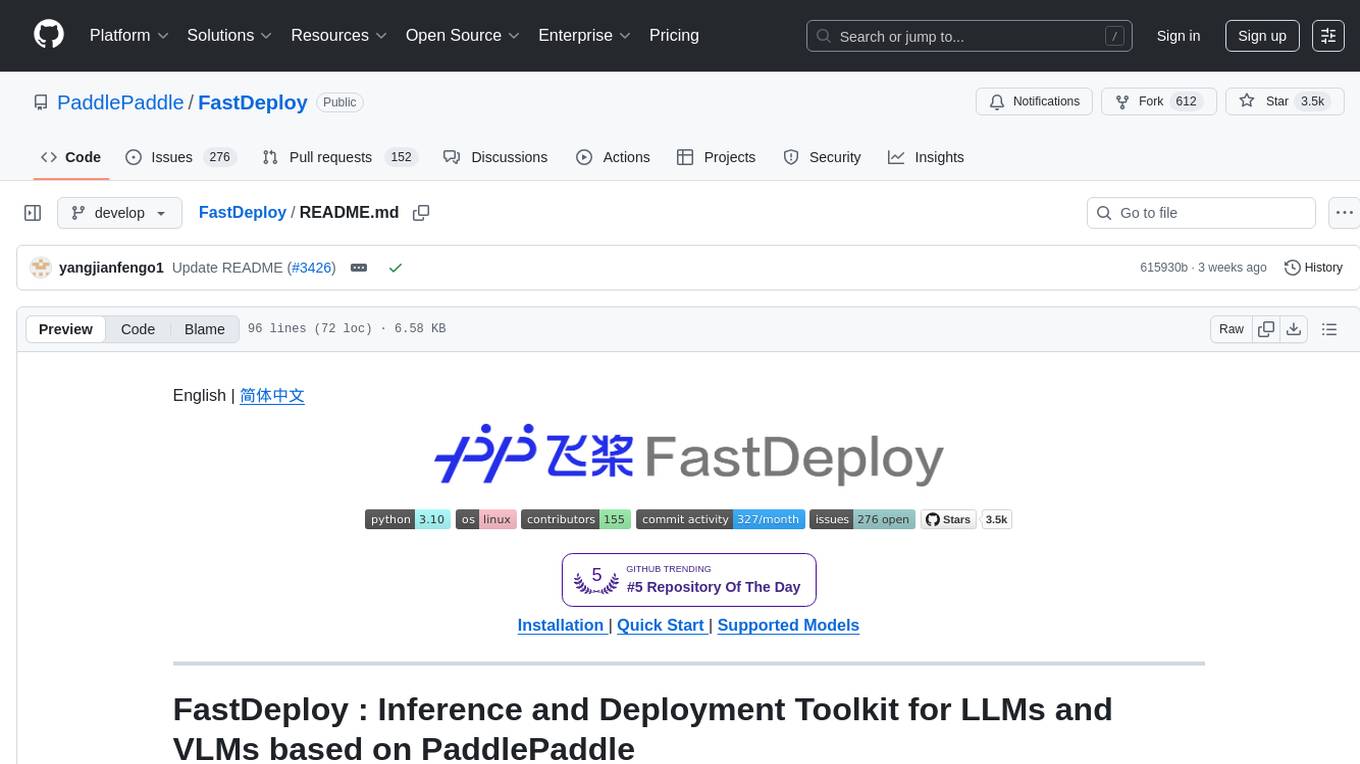
FastDeploy
FastDeploy is an inference and deployment toolkit for large language models and visual language models based on PaddlePaddle. It provides production-ready deployment solutions with core acceleration technologies such as load-balanced PD disaggregation, unified KV cache transmission, OpenAI API server compatibility, comprehensive quantization format support, advanced acceleration techniques, and multi-hardware support. The toolkit supports various hardware platforms like NVIDIA GPUs, Kunlunxin XPUs, Iluvatar GPUs, Enflame GCUs, and Hygon DCUs, with plans for expanding support to Ascend NPU and MetaX GPU. FastDeploy aims to optimize resource utilization, throughput, and performance for inference and deployment tasks.
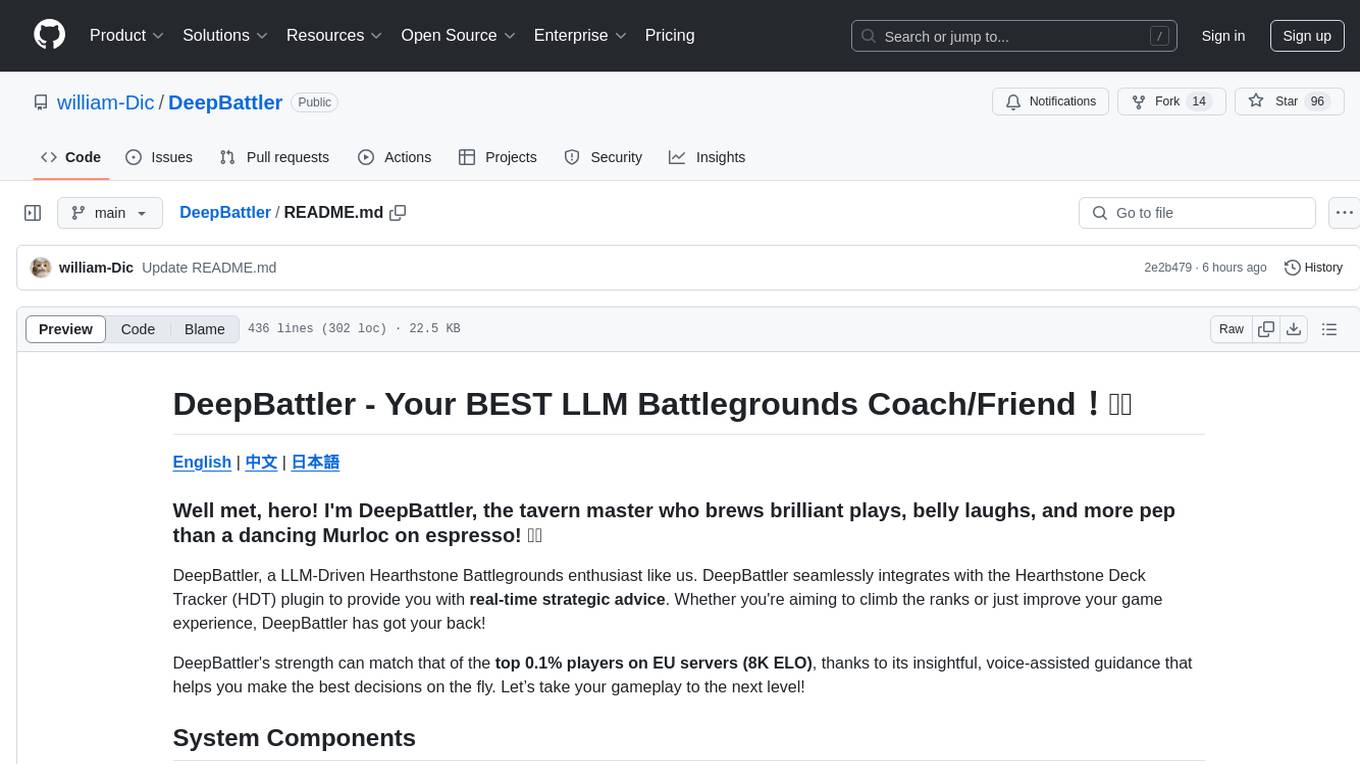
DeepBattler
DeepBattler is a tool designed for Hearthstone Battlegrounds players, providing real-time strategic advice and insights to improve gameplay experience. It integrates with the Hearthstone Deck Tracker plugin and offers voice-assisted guidance. The tool is powered by a large language model (LLM) and can match the strength of top players on EU servers. Users can set up the tool by adding dependencies, configuring the plugin path, and launching the LLM agent. DeepBattler is licensed for personal, educational, and non-commercial use, with guidelines on non-commercial distribution and acknowledgment of external contributions.
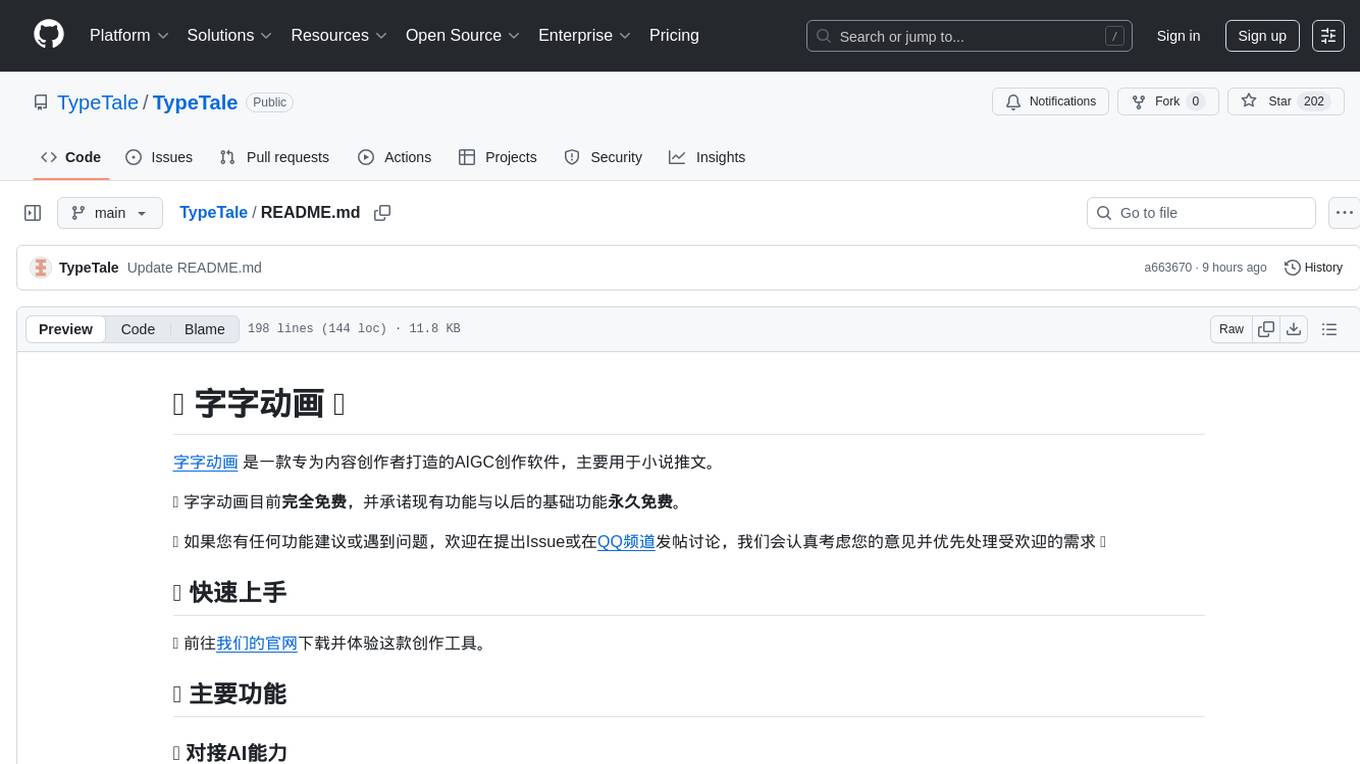
TypeTale
TypeTale is an AIGC creation software designed specifically for content creators, primarily used for novel promotion. It offers a wide range of AI capabilities such as image, video, and audio generation, as well as text processing and story extraction. The tool also provides workflow customization, AI assistant support, and a vast library of creative materials. With a user-friendly interface and system requirements compatible with Windows operating systems, TypeTale aims to streamline the content creation process for writers and creators.
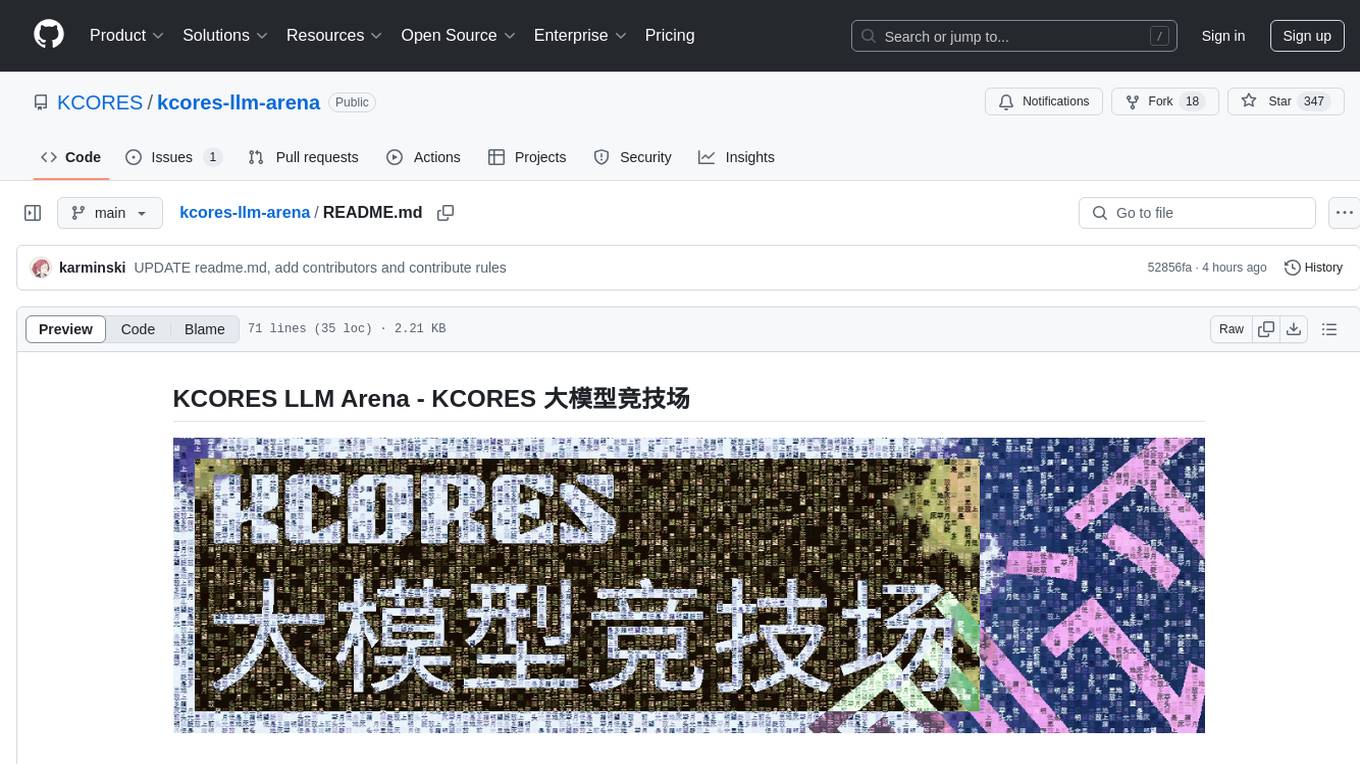
kcores-llm-arena
KCORES LLM Arena is a large model evaluation tool that focuses on real-world scenarios, using human scoring and benchmark testing to assess performance. It aims to provide an unbiased evaluation of large models in real-world applications. The tool includes programming ability tests and specific benchmarks like Mandelbrot Set, Mars Mission, Solar System, and Ball Bouncing Inside Spinning Heptagon. It supports various programming languages and emphasizes performance optimization, rendering, animations, physics simulations, and creative implementations.
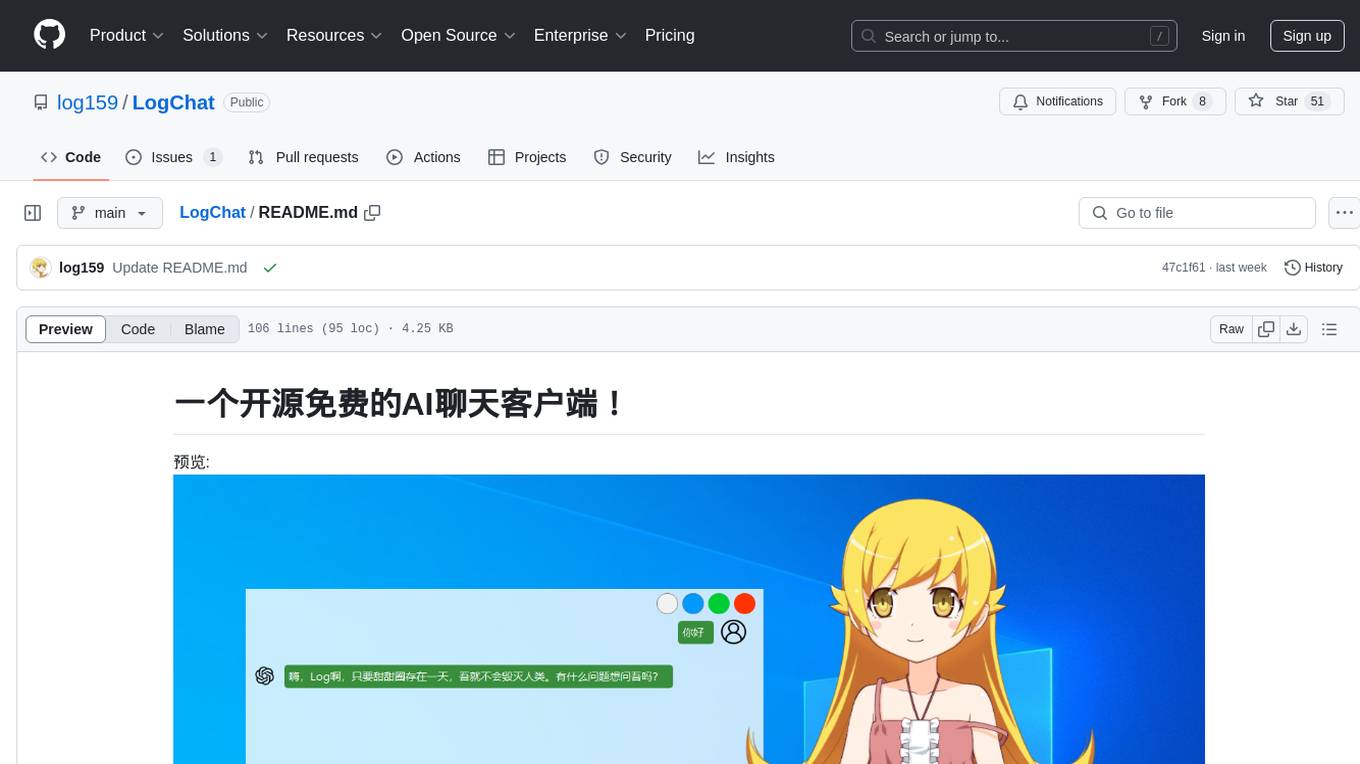
LogChat
LogChat is an open-source and free AI chat client that supports various chat models and technologies such as ChatGPT, 讯飞星火, DeepSeek, LLM, TTS, STT, and Live2D. The tool provides a user-friendly interface designed using Qt Creator and can be used on Windows systems without any additional environment requirements. Users can interact with different AI models, perform voice synthesis and recognition, and customize Live2D character models. LogChat also offers features like language translation, AI platform integration, and menu items like screenshot editing, clock, and application launcher.
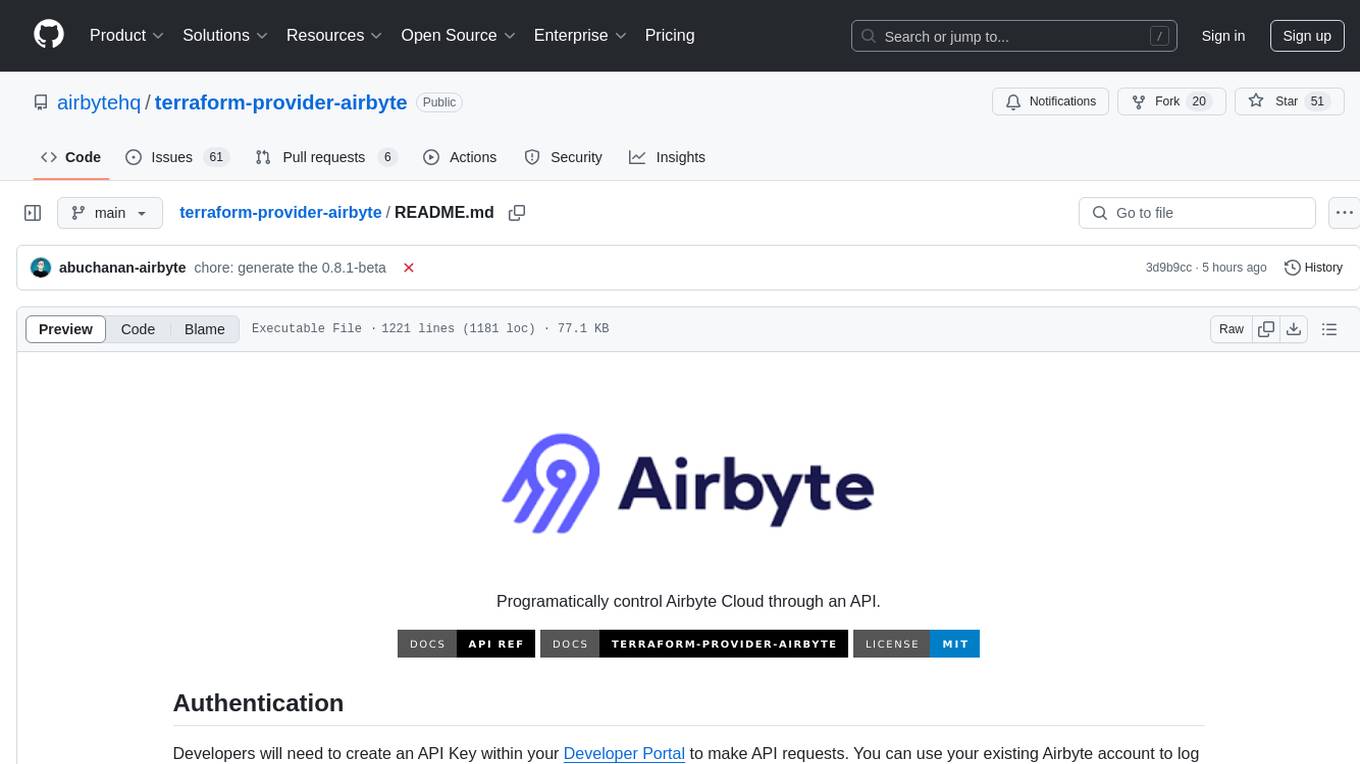
terraform-provider-airbyte
Programatically control Airbyte Cloud through an API. Developers can create an API Key within the Developer Portal to make API requests. The provider allows for integration building by showing network request information and API usage details. It offers resources and data sources for various destinations and sources, enabling users to manage data flow between different services.
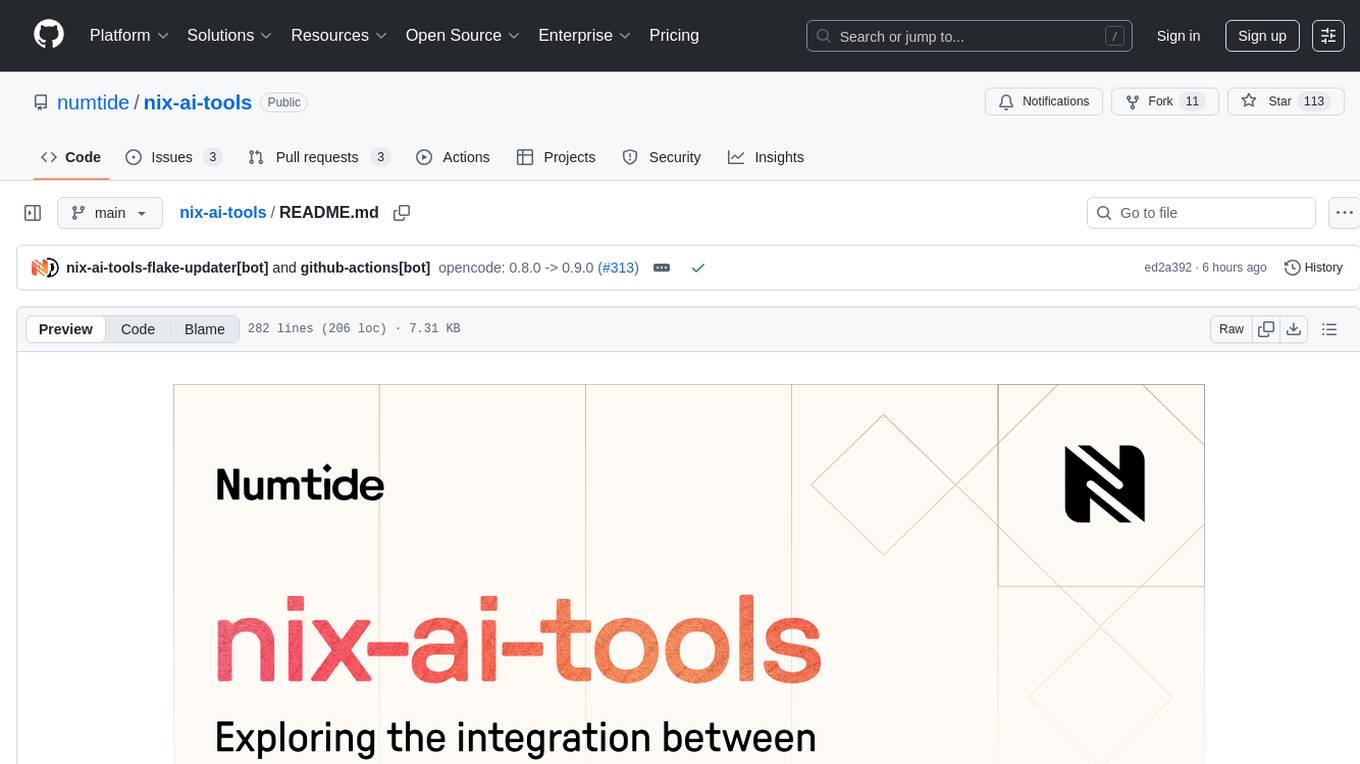
nix-ai-tools
Exploring the integration between Nix and AI coding agents, this repository serves as a testbed for packaging, sandboxing, and enhancing AI-powered development tools within the Nix ecosystem. It provides a collection of AI tools with descriptions, versions, sources, licenses, homepages, and usage instructions. The repository also supports daily updates using GitHub Actions and offers a platform for experimental features like sandboxed execution, provider abstraction, and tool composition in Nix environments. Contributions are welcome, and the Nix packaging code in this repository is licensed under MIT.
For similar tasks
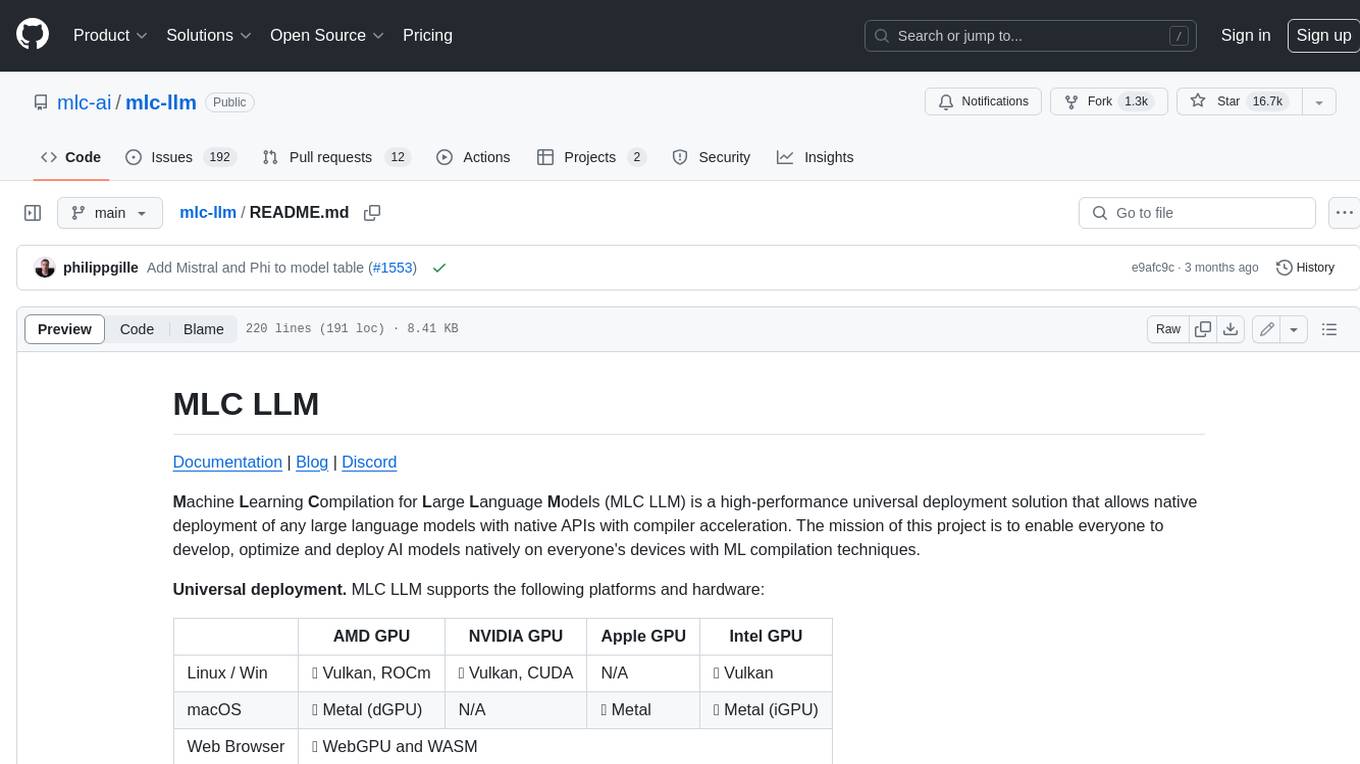
mlc-llm
MLC LLM is a high-performance universal deployment solution that allows native deployment of any large language models with native APIs with compiler acceleration. It supports a wide range of model architectures and variants, including Llama, GPT-NeoX, GPT-J, RWKV, MiniGPT, GPTBigCode, ChatGLM, StableLM, Mistral, and Phi. MLC LLM provides multiple sets of APIs across platforms and environments, including Python API, OpenAI-compatible Rest-API, C++ API, JavaScript API and Web LLM, Swift API for iOS App, and Java API and Android App.
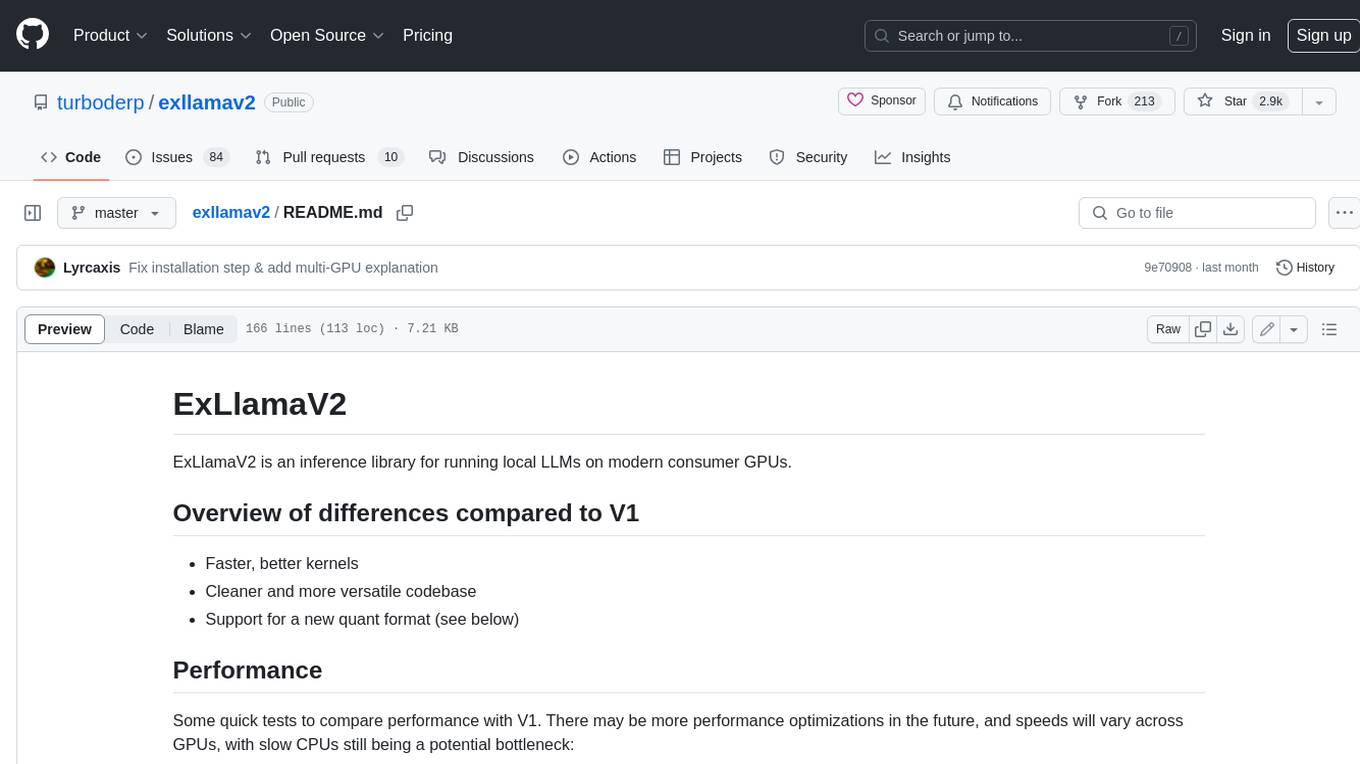
exllamav2
ExLlamaV2 is an inference library for running local LLMs on modern consumer GPUs. It is a faster, better, and more versatile codebase than its predecessor, ExLlamaV1, with support for a new quant format called EXL2. EXL2 is based on the same optimization method as GPTQ and supports 2, 3, 4, 5, 6, and 8-bit quantization. It allows for mixing quantization levels within a model to achieve any average bitrate between 2 and 8 bits per weight. ExLlamaV2 can be installed from source, from a release with prebuilt extension, or from PyPI. It supports integration with TabbyAPI, ExUI, text-generation-webui, and lollms-webui. Key features of ExLlamaV2 include: - Faster and better kernels - Cleaner and more versatile codebase - Support for EXL2 quantization format - Integration with various web UIs and APIs - Community support on Discord
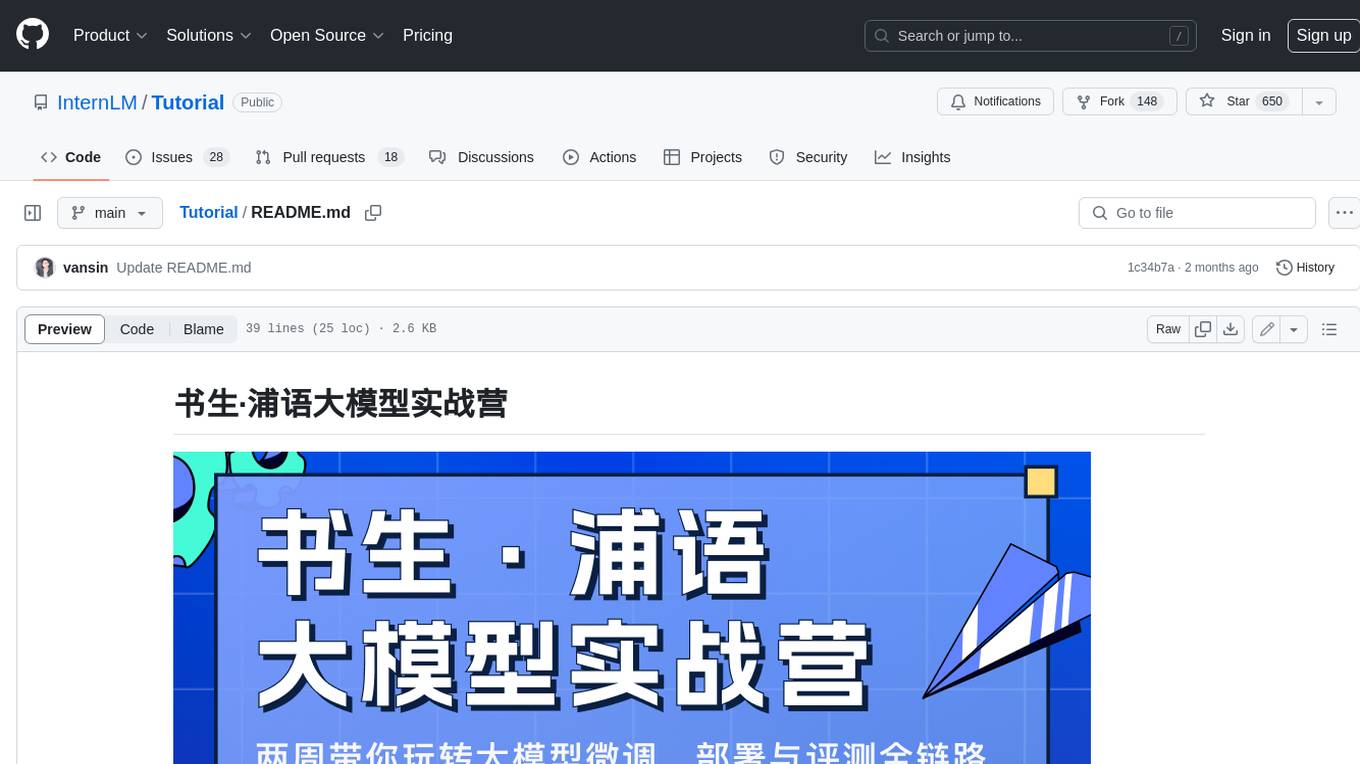
Tutorial
The Bookworm·Puyu large model training camp aims to promote the implementation of large models in more industries and provide developers with a more efficient platform for learning the development and application of large models. Within two weeks, you will learn the entire process of fine-tuning, deploying, and evaluating large models.
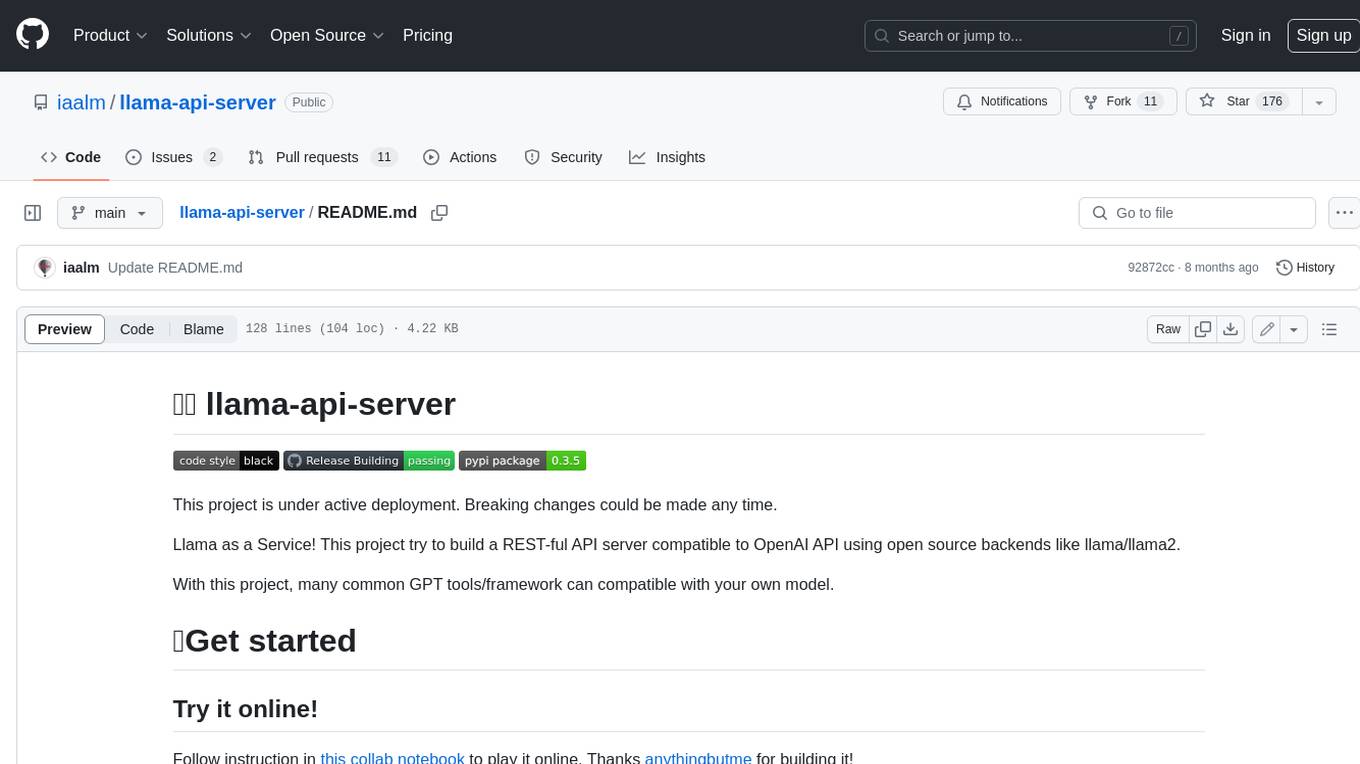
llama-api-server
This project aims to create a RESTful API server compatible with the OpenAI API using open-source backends like llama/llama2. With this project, various GPT tools/frameworks can be compatible with your own model. Key features include: - **Compatibility with OpenAI API**: The API server follows the OpenAI API structure, allowing seamless integration with existing tools and frameworks. - **Support for Multiple Backends**: The server supports both llama.cpp and pyllama backends, providing flexibility in model selection. - **Customization Options**: Users can configure model parameters such as temperature, top_p, and top_k to fine-tune the model's behavior. - **Batch Processing**: The API supports batch processing for embeddings, enabling efficient handling of multiple inputs. - **Token Authentication**: The server utilizes token authentication to secure access to the API. This tool is particularly useful for developers and researchers who want to integrate large language models into their applications or explore custom models without relying on proprietary APIs.
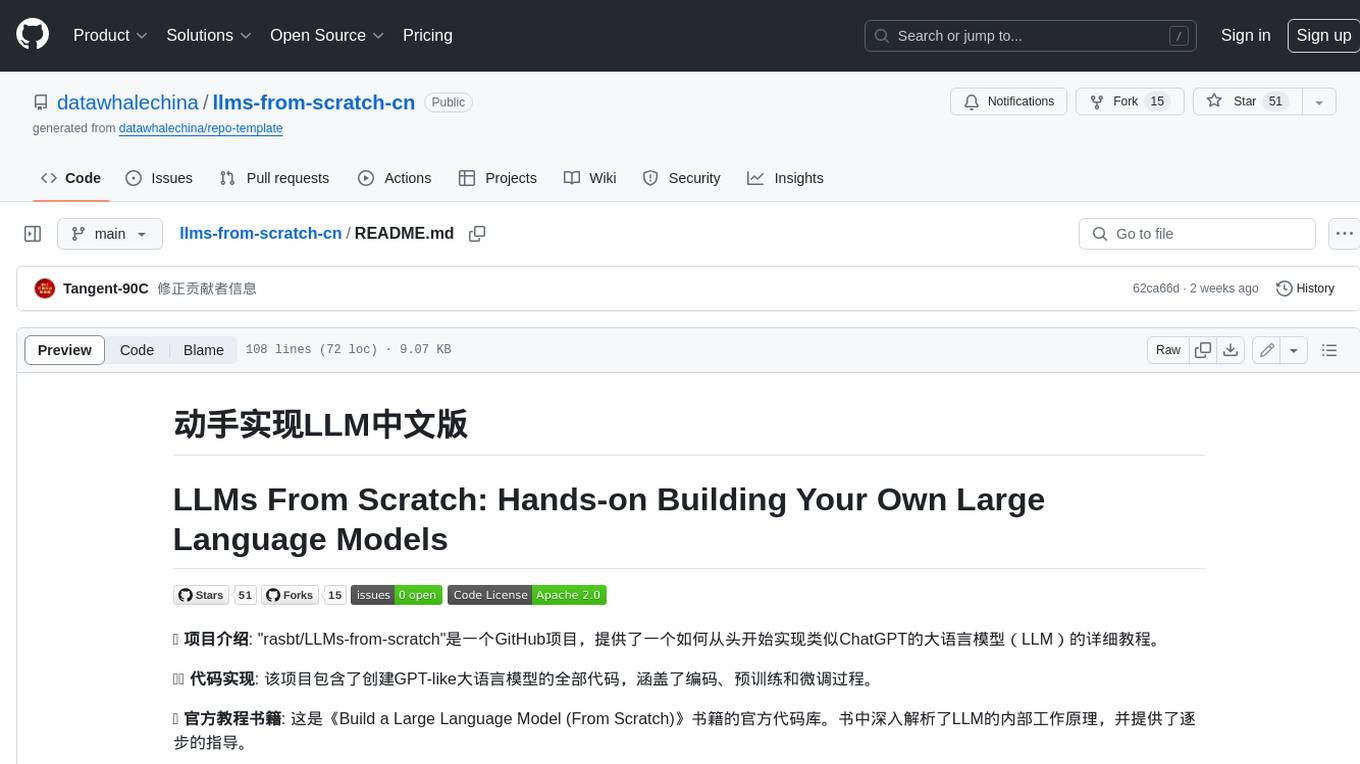
llms-from-scratch-cn
This repository provides a detailed tutorial on how to build your own large language model (LLM) from scratch. It includes all the code necessary to create a GPT-like LLM, covering the encoding, pre-training, and fine-tuning processes. The tutorial is written in a clear and concise style, with plenty of examples and illustrations to help you understand the concepts involved. It is suitable for developers and researchers with some programming experience who are interested in learning more about LLMs and how to build them.

llm_interview_note
This repository provides a comprehensive overview of large language models (LLMs), covering various aspects such as their history, types, underlying architecture, training techniques, and applications. It includes detailed explanations of key concepts like Transformer models, distributed training, fine-tuning, and reinforcement learning. The repository also discusses the evaluation and limitations of LLMs, including the phenomenon of hallucinations. Additionally, it provides a list of related courses and references for further exploration.
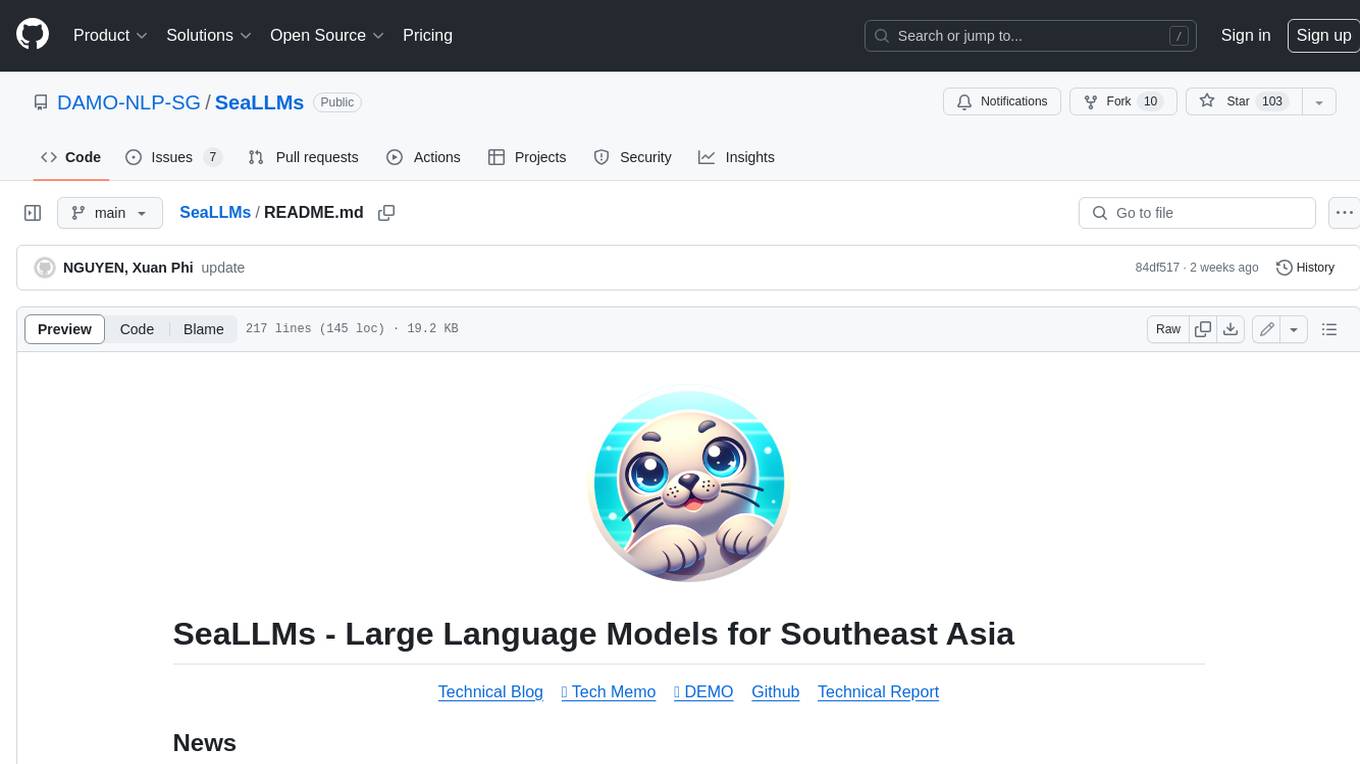
SeaLLMs
SeaLLMs are a family of language models optimized for Southeast Asian (SEA) languages. They were pre-trained from Llama-2, on a tailored publicly-available dataset, which comprises texts in Vietnamese 🇻🇳, Indonesian 🇮🇩, Thai 🇹🇭, Malay 🇲🇾, Khmer🇰🇭, Lao🇱🇦, Tagalog🇵🇭 and Burmese🇲🇲. The SeaLLM-chat underwent supervised finetuning (SFT) and specialized self-preferencing DPO using a mix of public instruction data and a small number of queries used by SEA language native speakers in natural settings, which **adapt to the local cultural norms, customs, styles and laws in these areas**. SeaLLM-13b models exhibit superior performance across a wide spectrum of linguistic tasks and assistant-style instruction-following capabilities relative to comparable open-source models. Moreover, they outperform **ChatGPT-3.5** in non-Latin languages, such as Thai, Khmer, Lao, and Burmese.
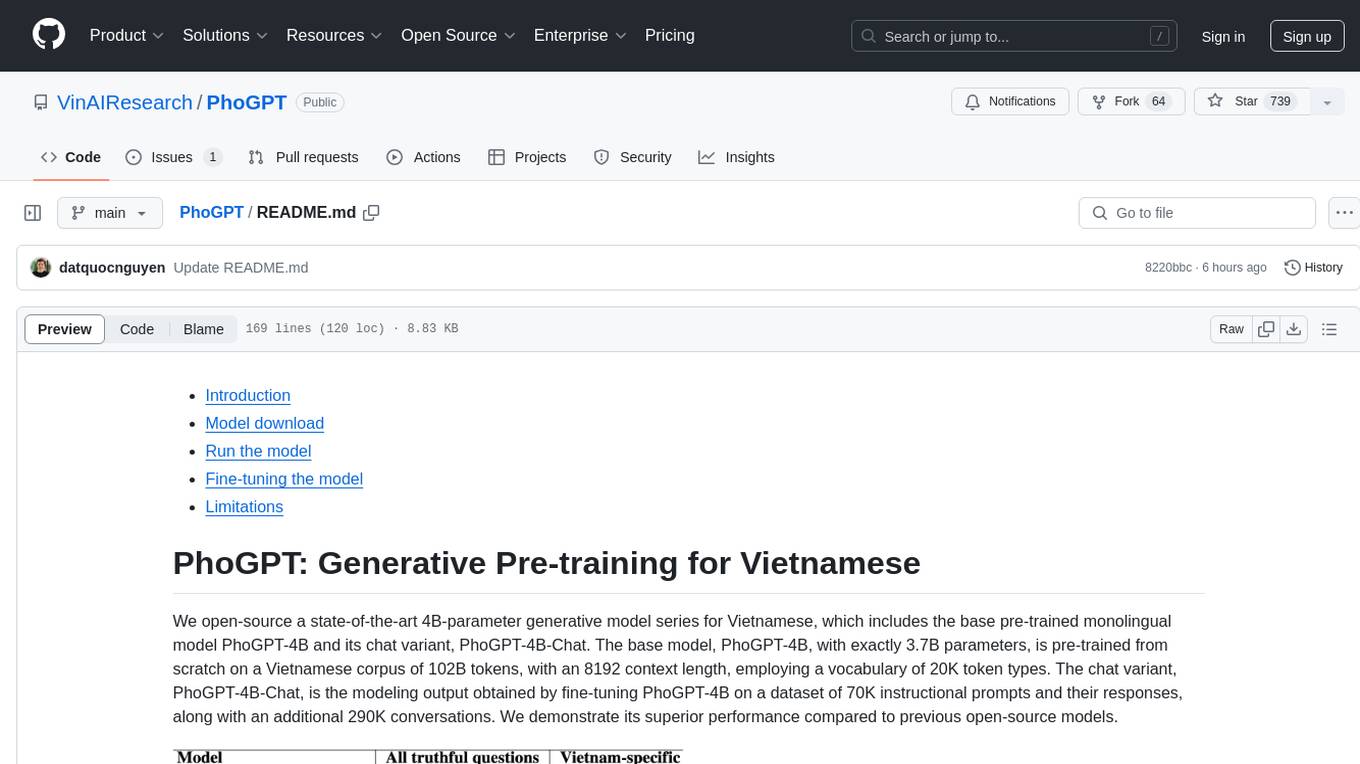
PhoGPT
PhoGPT is an open-source 4B-parameter generative model series for Vietnamese, including the base pre-trained monolingual model PhoGPT-4B and its chat variant, PhoGPT-4B-Chat. PhoGPT-4B is pre-trained from scratch on a Vietnamese corpus of 102B tokens, with an 8192 context length and a vocabulary of 20K token types. PhoGPT-4B-Chat is fine-tuned on instructional prompts and conversations, demonstrating superior performance. Users can run the model with inference engines like vLLM and Text Generation Inference, and fine-tune it using llm-foundry. However, PhoGPT has limitations in reasoning, coding, and mathematics tasks, and may generate harmful or biased responses.
For similar jobs

sweep
Sweep is an AI junior developer that turns bugs and feature requests into code changes. It automatically handles developer experience improvements like adding type hints and improving test coverage.

teams-ai
The Teams AI Library is a software development kit (SDK) that helps developers create bots that can interact with Teams and Microsoft 365 applications. It is built on top of the Bot Framework SDK and simplifies the process of developing bots that interact with Teams' artificial intelligence capabilities. The SDK is available for JavaScript/TypeScript, .NET, and Python.

ai-guide
This guide is dedicated to Large Language Models (LLMs) that you can run on your home computer. It assumes your PC is a lower-end, non-gaming setup.

classifai
Supercharge WordPress Content Workflows and Engagement with Artificial Intelligence. Tap into leading cloud-based services like OpenAI, Microsoft Azure AI, Google Gemini and IBM Watson to augment your WordPress-powered websites. Publish content faster while improving SEO performance and increasing audience engagement. ClassifAI integrates Artificial Intelligence and Machine Learning technologies to lighten your workload and eliminate tedious tasks, giving you more time to create original content that matters.

chatbot-ui
Chatbot UI is an open-source AI chat app that allows users to create and deploy their own AI chatbots. It is easy to use and can be customized to fit any need. Chatbot UI is perfect for businesses, developers, and anyone who wants to create a chatbot.

BricksLLM
BricksLLM is a cloud native AI gateway written in Go. Currently, it provides native support for OpenAI, Anthropic, Azure OpenAI and vLLM. BricksLLM aims to provide enterprise level infrastructure that can power any LLM production use cases. Here are some use cases for BricksLLM: * Set LLM usage limits for users on different pricing tiers * Track LLM usage on a per user and per organization basis * Block or redact requests containing PIIs * Improve LLM reliability with failovers, retries and caching * Distribute API keys with rate limits and cost limits for internal development/production use cases * Distribute API keys with rate limits and cost limits for students

uAgents
uAgents is a Python library developed by Fetch.ai that allows for the creation of autonomous AI agents. These agents can perform various tasks on a schedule or take action on various events. uAgents are easy to create and manage, and they are connected to a fast-growing network of other uAgents. They are also secure, with cryptographically secured messages and wallets.

griptape
Griptape is a modular Python framework for building AI-powered applications that securely connect to your enterprise data and APIs. It offers developers the ability to maintain control and flexibility at every step. Griptape's core components include Structures (Agents, Pipelines, and Workflows), Tasks, Tools, Memory (Conversation Memory, Task Memory, and Meta Memory), Drivers (Prompt and Embedding Drivers, Vector Store Drivers, Image Generation Drivers, Image Query Drivers, SQL Drivers, Web Scraper Drivers, and Conversation Memory Drivers), Engines (Query Engines, Extraction Engines, Summary Engines, Image Generation Engines, and Image Query Engines), and additional components (Rulesets, Loaders, Artifacts, Chunkers, and Tokenizers). Griptape enables developers to create AI-powered applications with ease and efficiency.
